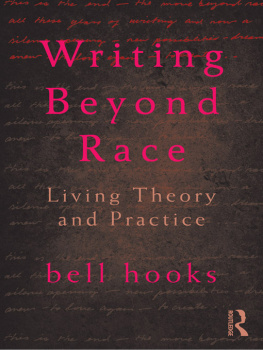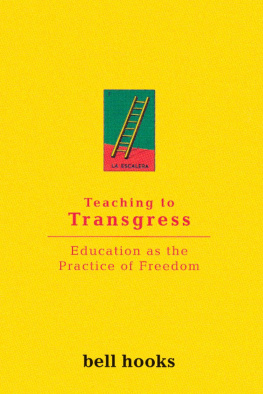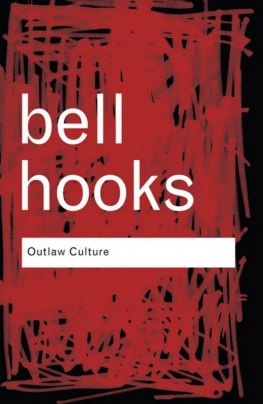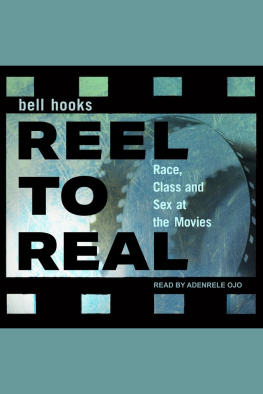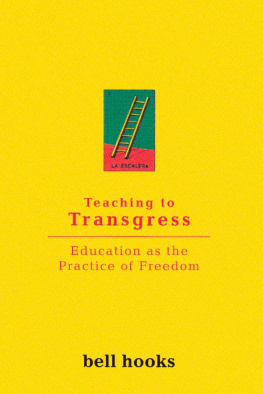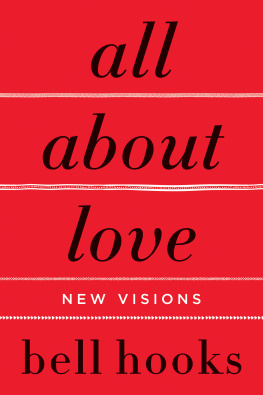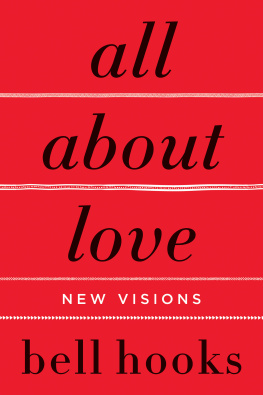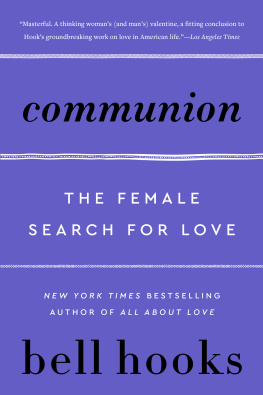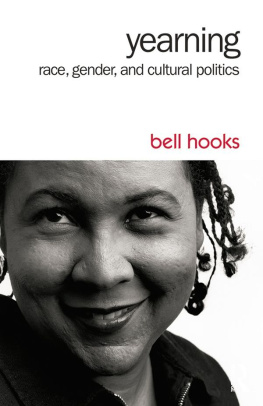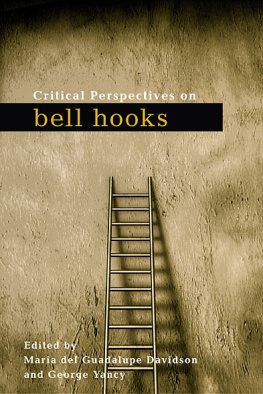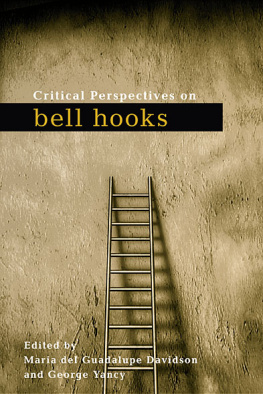bell hooks - Writing Beyond Race
Here you can read online bell hooks - Writing Beyond Race full text of the book (entire story) in english for free. Download pdf and epub, get meaning, cover and reviews about this ebook. year: 2012, publisher: Taylor and Francis, genre: Politics. Description of the work, (preface) as well as reviews are available. Best literature library LitArk.com created for fans of good reading and offers a wide selection of genres:
Romance novel
Science fiction
Adventure
Detective
Science
History
Home and family
Prose
Art
Politics
Computer
Non-fiction
Religion
Business
Children
Humor
Choose a favorite category and find really read worthwhile books. Enjoy immersion in the world of imagination, feel the emotions of the characters or learn something new for yourself, make an fascinating discovery.
- Book:Writing Beyond Race
- Author:
- Publisher:Taylor and Francis
- Genre:
- Year:2012
- Rating:5 / 5
- Favourites:Add to favourites
- Your mark:
- 100
- 1
- 2
- 3
- 4
- 5
Writing Beyond Race: summary, description and annotation
We offer to read an annotation, description, summary or preface (depends on what the author of the book "Writing Beyond Race" wrote himself). If you haven't found the necessary information about the book — write in the comments, we will try to find it.
Writing Beyond Race — read online for free the complete book (whole text) full work
Below is the text of the book, divided by pages. System saving the place of the last page read, allows you to conveniently read the book "Writing Beyond Race" online for free, without having to search again every time where you left off. Put a bookmark, and you can go to the page where you finished reading at any time.
Font size:
Interval:
Bookmark:
Beyond Race
bell hooks

appeared originally as A Community of Care in Belonging, hooks (2009):224230. 2009 Taylor & Francis.
A version of appeared on Mindful.org as Surrendered to Love. 2011 bell hooks
First published 2013 by Routledge 711 Third Avenue, New York, NY 10017
Simultaneously published in the UK by Routledge 2 Park Square, Milton Park, Abingdon, Oxon OX14 4RN
Routledge is an imprint of the Taylor & Francis Group, an informa business
2013 Taylor & Francis
The right of bell hooks to be identified as author of this work has been asserted by him/her in accordance with sections 77 and 78 of the Copyright, Designs and Patents Act 1988.
All rights reserved. No part of this book may be reprinted or reproduced or utilised in anyform or by any electronic, mechanical, or other means, now known or hereafter invented,including photocopying and recording, or in any information storage or retrieval system,without permission in writing from the publishers.
Trademark notice: Product or corporate names may be trademarks or registered trademarks,and are used only for identification and explanation without intent to infringe.
Library of Congress Cataloging in Publication Data
hooks, bell. Writing beyond race : living theory and practice/bell hooks. 1st ed. p. cm. 1. RacismUnited StatesHistory. 2. United StatesRace relationsHistory. I. Title. E184.A1H654 2013 305.800973dc23 2012014263
ISBN: 978-0-415-53914-2 (hbk) ISBN: 978-0-415-53915-9 (pbk) ISBN: 978-0-203-10849-9 (ebk)
Typeset in BemboStd by Apex CoVantage
for James Hillman beloved comrade
In recent years my work has focused on the role of love in ending domination. Contemplating the factors that lead people to struggle for justice and strive to build community has led me to think critically about the place of love. Whether the issue is ending racism, sexism, homophobia, or class elitism, when I interview folks about what leads them to overcome dominator thinking and action they invariably speak about love, about learning acceptance of difference from someone they care about. They talk about being rigorously challenged by the longing to connect and join with someone who is either radically different or holds beliefs and opinions so unlike their own as to be a source of estrangement and conflict, so much so that only sustained, caring, critical vigilance can ensure continued contact. For many of these individuals it is active involvement with movements to end domination that has pushed them in the direction of critical thinking and change.
When feminist theory and cultural criticism privileged ending domination, challenging all of us to move beyond the barriers created by race, gender, class, sexuality, and/or religious differences, for a time at least, it appeared that we would be entering a brave new world where differences could be understood and embraced, where we would all seek to learn from the other, whomever that other might be. All the theories of border crossing, of finding a way to get a bit of the other, did not fundamentally change the nature of dominator culture. Our theory was far more progressive and inclusive in its vision than our everyday life practice. In our everyday lives all of us confront barriers to communicationdivisive hierarchies that make joining together difficult, if not impossible. Many of us found that it was easier to name the problem and to deconstruct it, and yet it was hard to create theories that would help us build community, help us border cross with the intention of truly remaining connected in a space of difference long enough to be transformed.
Public discourses about race and gender did create new ways of thinking and knowing. Talking about class and the various ways class differences separate groups has been much harder. Class standing and status tend frequently to link us more intimately to the dominant economic system and its concomitant hierarchies. For example: it is much more likely that a white person will bond with a black person when the two share a common class lifestyle. It is less likely that a materially prosperous person will establish a mutual bond with someone who is poor and indigent. One of the most difficult and delicate subjects to discuss among African Americans is the reality of class differences and of class difference among us. The central position race has occupied in our political discourse has often obscured the way in which class differences disrupt notions of racial unity. And yet, today, class differences coupled with racial integration have created a cultural context where the very meaning of blackness and its impact on our lives differs greatly among black people. There is no longer a common notion of shared black identity.
In other words, a sense of shared identity is no longer a platform that can draw folks together in meaningful solidarity. Along with class, gender issues and feminist awareness have served to place black folks in different camps, creating conflicts that can only be resolved through education for critical consciousness. There is also the reality of changing religious practices. There was a time in our nation when it was just assumed that every black person was a Christian or at least coming from a Christian background. This is simply no longer the case. Black children today have diverse religious practices. Some are raised in Muslim and Buddhist traditions with no understanding of Christian beliefs. And more young black people than ever before choose no religious practice at all. Hence the shared theological language that once served as a basis of communication and bonding can no longer be assumed.
Many of these changes to the nature of black identity are a direct consequence of racial integration. Prior to racial integration most educated black folks, especially those with higher degrees, were educated within a similar segregated pedagogical context and were more than likely to have a shared mindset. It is political movement that has allowed greater class mobility, making it possible for materially prosperous black folks to leave historically black communities and live elsewhere. The opening up of educational possibilities has led to the formation of classes of black individuals with radically different educational backgrounds, diverse perspectives and values, as well as varied political leanings. Consequently, bonding between black folks (even within families where there are not major class differences) has become more difficult.
Significantly, despite class differences, as a group, white people (whether consciously or unconsciously) maintain some degree of bonding despite diversities of standpoint. White supremacist thinking continues to be the invisible and visible glue that keeps white folks connected irrespective of many other differences. Politically, white supremacist thinking was created to serve this purpose. Imprinted on the consciousness of every white child at birth, reinforced by the culture, white supremacist thinking tends to function unconsciously. This is the primary reason it is so difficult to challenge and change.
In order to talk openly and honestly about race in the United States it is helpful to begin with the understanding that it is white supremacist thinking and practice that has been the political foundation undergirding all systems of domination based on skin color and ethnicity. When describing the political system that we live within here in the United States, more often than not, I use the complicated phrase imperialist white supremacist capitalist patriarchy
Font size:
Interval:
Bookmark:
Similar books «Writing Beyond Race»
Look at similar books to Writing Beyond Race. We have selected literature similar in name and meaning in the hope of providing readers with more options to find new, interesting, not yet read works.
Discussion, reviews of the book Writing Beyond Race and just readers' own opinions. Leave your comments, write what you think about the work, its meaning or the main characters. Specify what exactly you liked and what you didn't like, and why you think so.

